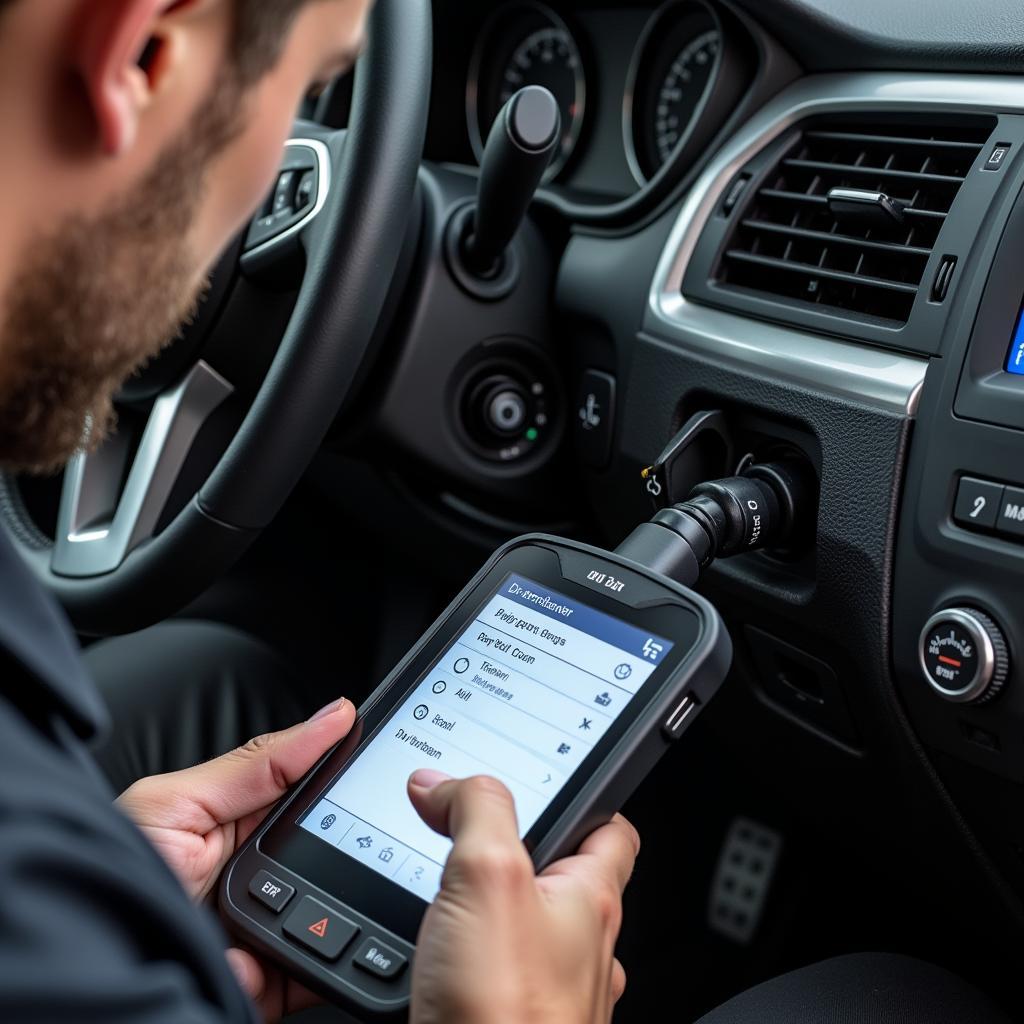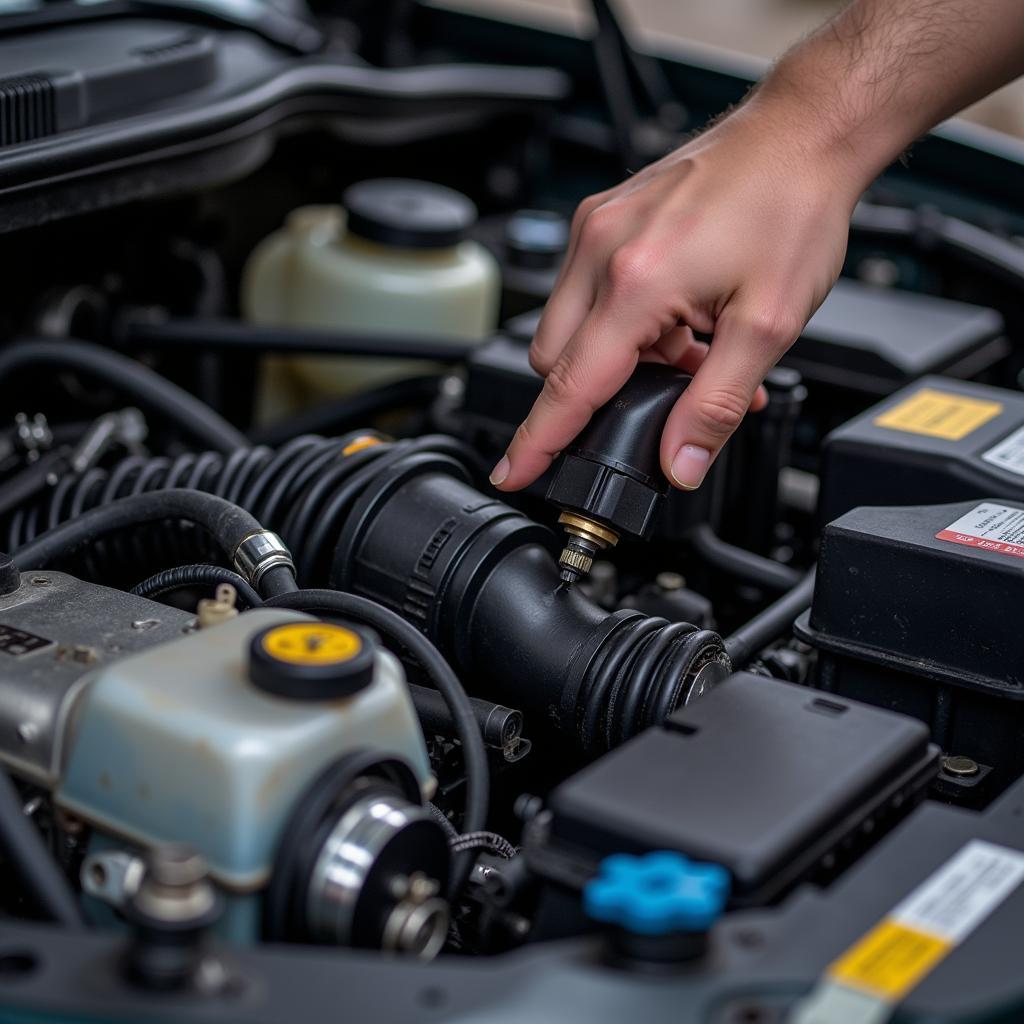Modern vehicles are increasingly reliant on complex electronic systems. When issues arise, car diagnostic tools are crucial for identifying the root cause. But Are Car Diagnostics Accurate, and how much can you rely on them for repairs? This comprehensive guide delves into the world of car diagnostics, exploring their accuracy, limitations, and what you need to know for informed car maintenance.
How Accurate are Car Diagnostic Tests?
Car diagnostic tests are generally very accurate, especially when performed with high-quality equipment and interpreted by experienced mechanics. These tests tap into your vehicle’s onboard computer, the Engine Control Unit (ECU), to retrieve Diagnostic Trouble Codes (DTCs). These codes act like an electronic breadcrumb trail, pointing to potential areas where the vehicle’s performance deviates from pre-programmed parameters.
 Car Diagnostic Test in Progress
Car Diagnostic Test in Progress
However, it’s crucial to remember that DTCs are not a definitive diagnosis. They indicate symptoms rather than the exact cause. For instance, a “lean exhaust” code could stem from a faulty oxygen sensor, a vacuum leak, or even a problem with the fuel system.
Factors Influencing Car Diagnostic Accuracy
Several factors can influence the accuracy of car diagnostic tests:
- Quality of the Diagnostic Tool: Basic code readers might only display generic codes, while professional-grade scanners offer detailed information and manufacturer-specific codes, leading to a more precise diagnosis. Looking for high-quality OEM car diagnostic tools is essential for accurate results.
- Mechanic’s Expertise: Interpreting DTCs requires knowledge and experience. A skilled mechanic can differentiate between a code’s potential causes, combining their expertise with visual inspections and additional tests to pinpoint the issue accurately.
- Vehicle’s Age and Condition: Older vehicles might have wiring issues or degraded sensors that could trigger false codes. Similarly, previous repairs using substandard parts can also lead to inaccurate readings.
- Intermittent Problems: Intermittent issues, those that occur sporadically, can be particularly challenging to diagnose as the fault might not be present during the diagnostic scan.
Common Misconceptions about Car Diagnostics
Let’s debunk some common misconceptions surrounding car diagnostics:
1. A Check Engine Light Always Means a Major Problem: While a flashing check engine light often indicates a serious issue requiring immediate attention, a steady light could signify something as simple as a loose gas cap.
2. Car Diagnostics Can Diagnose Every Problem: Car diagnostics focus primarily on the engine and emissions systems. Issues with the body, interior, or other mechanical components might not trigger a DTC.
3. Clearing Codes Solves the Underlying Problem: While clearing codes can temporarily turn off the check engine light, it doesn’t address the root cause. The light will reappear if the issue persists.
Maximizing the Effectiveness of Car Diagnostics
To ensure you benefit from the most accurate diagnosis, consider these tips:
- Choose a Reputable Mechanic: Opt for a mechanic specializing in car diagnostics who uses advanced equipment and has a proven track record.
- Provide a Detailed History: Inform your mechanic about any recent repairs, modifications, or symptoms you’ve noticed.
- Ask for Clarification: Don’t hesitate to ask your mechanic to explain the DTCs and the diagnostic process.
When are Car Diagnostics Inaccurate?
While generally reliable, there are instances where car diagnostics might be inaccurate. These include:
- Sensor Malfunctions: A faulty sensor can send incorrect data to the ECU, triggering a false code.
- Wiring Problems: Damaged or corroded wiring can disrupt communication between the ECU and various components, leading to misleading readings.
- Aftermarket Modifications: Modifications not programmed into the ECU can confuse the system and generate inaccurate codes.
 Mechanic Inspecting Engine Wiring
Mechanic Inspecting Engine Wiring
Car Diagnostics Near Me
Finding a reliable car diagnostics service is crucial for accurate results and effective repairs. Search for “car diagnostic machine near me” to locate trusted professionals in your area.
Conclusion
Car diagnostics are an indispensable tool in modern car repair, offering valuable insights into potential problems. While generally accurate, understanding their limitations is crucial for informed car maintenance. By choosing qualified professionals, providing comprehensive vehicle history, and understanding that DTCs are indicative rather than definitive, you can maximize the accuracy of your car diagnostics and ensure your vehicle receives the appropriate care.
FAQs about Car Diagnostic Accuracy
1. How Often Should I Get a Car Diagnostic Test?
It’s a good practice to have a car diagnostic test performed annually or whenever your check engine light illuminates.
2. Can I Perform Car Diagnostics Myself?
While affordable code readers are available for DIY enthusiasts, investing in professional car diagnostics from a qualified mechanic is recommended for accurate results and expert interpretation.
3. Will Car Diagnostics Void My Warranty?
No, having a car diagnostic test will not void your warranty. However, be sure to inform your mechanic about any aftermarket modifications.
4. Are Car Diagnostics Expensive?
The cost of car diagnostics varies depending on the service provider and the complexity of the issue. However, it’s a worthwhile investment compared to the potential cost of neglecting a problem.
5. Can Car Diagnostics Detect Transmission Problems?
Yes, car diagnostics can detect certain transmission problems. The Transmission Control Module (TCM) within your vehicle communicates with the ECU, and issues will often trigger a DTC.
Do you need help with car diagnostics in Blackburn? Consider contacting Irshad Car Diagnostic.
Contact our team at Irshad car diagnostic blackburn for a comprehensive diagnostic assessment and expert solutions.
Still have questions about car diagnostics or need further assistance?
Feel free to reach out to our team via WhatsApp: +1(641)206-8880, Email: [email protected]. We’re available 24/7 to address your concerns and provide expert guidance.

Leave a Reply